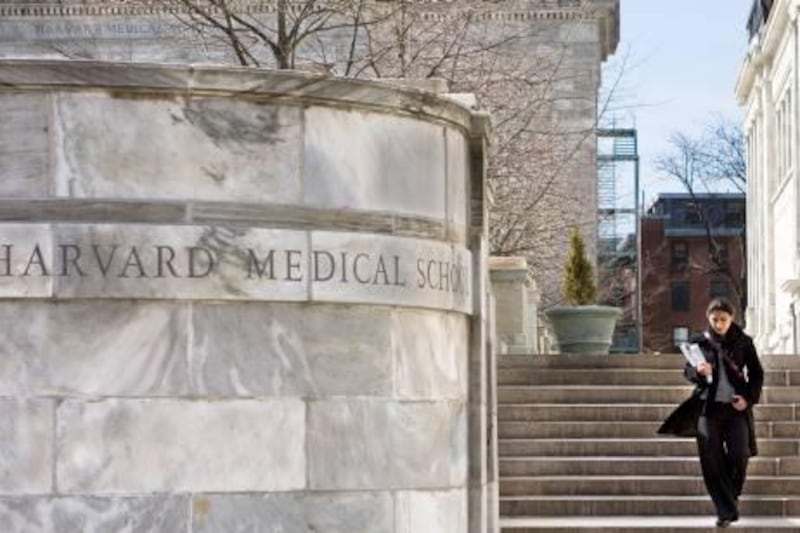CAMBRIDGE, MASSACHUSETTS // When some of the brightest Arab minds converged on Harvard University last weekend, it represented a virtual - if temporary - boom in the Arab presence there.
While Harvard is one of the western world's most prestigious centres of learning, only 80 Arab students are currently enrolled at the institution.
The Harvard Arab Weekend featured individuals of extraordinary accomplishment, with speakers ranging from Prince Turki al Faisal, the former Saudi intelligence chief, to Ghassan Haddad, the director of internationalisation at Facebook, the social networking website.
But the main agenda of the gathering was a more far-reaching task, said Samer Lahham, vice president of the Harvard Arab Alumni Association: to increase Arab student enrolment at the venerable university and to generate more interest among its faculty in the Middle East and North Africa.
Mr Lahham, a Jordanian, graduated from Harvard Business School in 2006 and he remembered then asking the dean why the school did not have a research centre in the Middle East.
"The answer I got was that it would have to be driven by faculty interest and there was no faculty interest in the region," he recalled. "This tells you something about the homogeneity of the faculty group here."
The admissions process at Harvard, which has educated eight US presidents including Barack Obama, is tough and tuition fees are high, currently more than US$33,000 (Dh121,000) for one year of undergraduate study.
From within the Mena region, Turkey sends the highest number of students to Harvard, with 96 students currently studying there, followed by Israel with 85 students, then the entire Arab world with 80 students, according to statistics from the Harvard Arab Alumni Association.
From within the Arab world, Lebanon accounts for 23 students, Saudi Arabia has 14 students, and Egypt has 12 students. There are three students from the UAE at Harvard.
"Unless you go to a top school, the educational system in the Arab world doesn't prepare you for a top university," said Mr Lahham, who attended the Amman Baccalaureate School and now works in Dubai for Booz & Co, the management consultants.
"You can't get in to Harvard by grades alone or memorising information for exams. You need to submit a good personal essay as well as show excellence in English. We need to address this with students early on when they're still young."
As well as a scholarship fund, which Mr Lahham said was on track to raise $10 million within five years, Arab alumni visit schools in the Arab world to provide mentoring to students and to encourage them to seek academic success.
About 650 people are members of the Harvard Arab Alumni Association but it has about 1,800 e-mail subscribers. "We are unique at Harvard because we represent such a broad geographical region, not one particular country, college or interest," said Mr Lahham.
Several hundred people attended the talks and panel discussions at the Harvard Arab Weekend, which tackled topics including the future of Iraq, Iran, entrepreneurship, health and education.
Other speakers included Queen Noor of Jordan and Naif al Mutawa, creator of The 99, the first Islamic comic superheroes. Leading business figures included Naguib Sawiris, executive chairman of Orascom Telecom Holding, the Egyptian conglomerate, and Sinan al Shabib, governor of Iraq's central bank.
Arab students hope the event would prove to be more than just another networking opportunity and lead to actual collaboration to tackle the many challenges facing the Arab world today.
"Since the attacks of 9/11, there has been a growth in courses in the US about Islam and the Middle East, but that doesn't necessarily mean there's any better attempt to understand the Middle East," said Diana Buttu, a former adviser to Mahmoud Abbas, the Palestinian president. She is now doing a fellowship at the Belfer Centre for Science and International Affairs at Harvard's Kennedy School of Government thanks to a scholarship from the Dubai Initiative, a joint venture between the Dubai and Kennedy schools of government.
"We Arabs also need to do more to change the way we are viewed in this country if we're ever going to change the way the US goes about its business in the Middle East," she said.
Othman Mohammed, a Palestinian doctor who is doing a psychiatry residency at Harvard-affiliated medical centres, said he enjoyed the weekend's debates but also hoped that other Arab attendees would do more than just try to further their own careers and seek wasta or influence.
"There's so much that needs to be done in the Arab world just in terms of health and education and I hope this conference will lead to actual partnerships to tackle these problems," he said.
Abdullah Mohammed, who is from Saudi Arabia and had just completed a business course at Harvard, also attended the conference. He said contrary to the many media reports about rising Islamophobia in the US, he had not suffered any discrimination and his experience of living and studying in the US would prove invaluable when he returned home to help to run the family publishing business.
"I see conflict [about Muslims in the US] in the media but I haven't experienced anything like that here," he said. "And this weekend has been great for exchanging ideas and connections."






